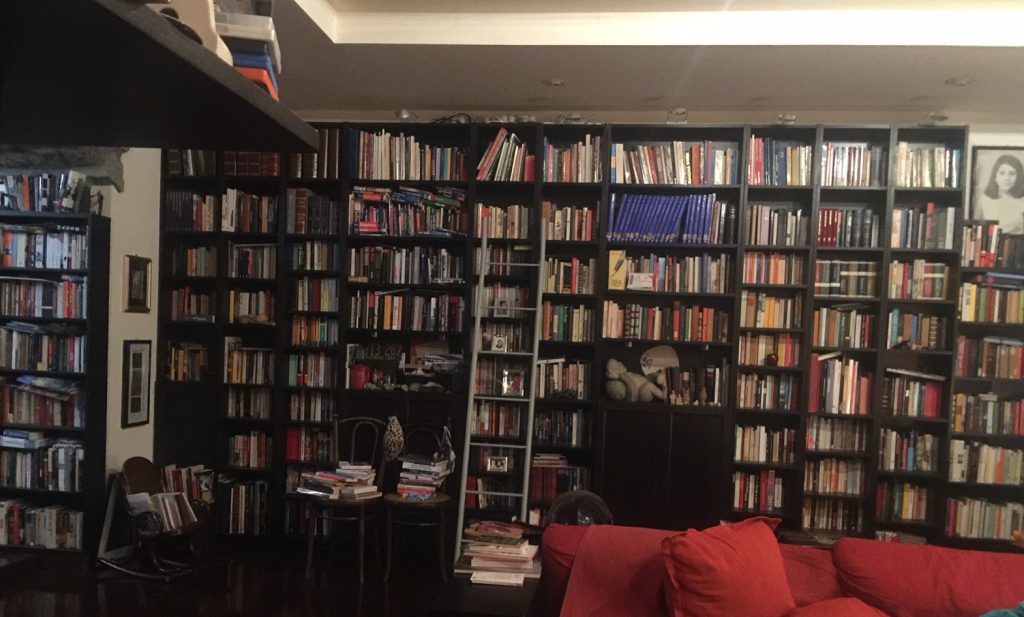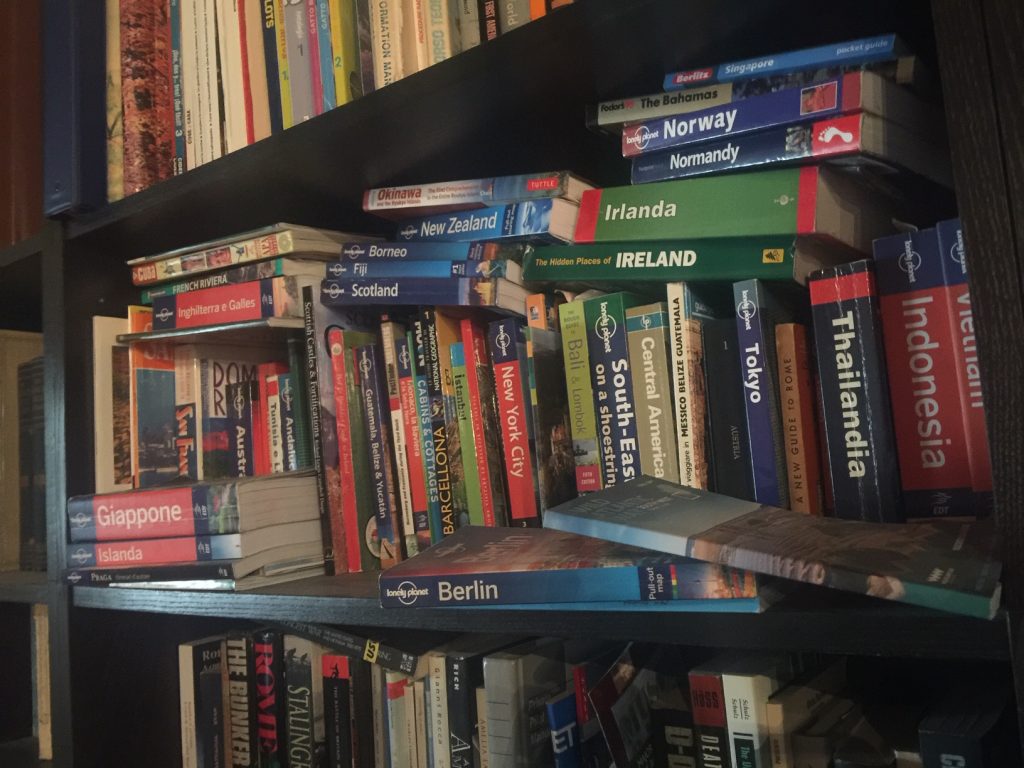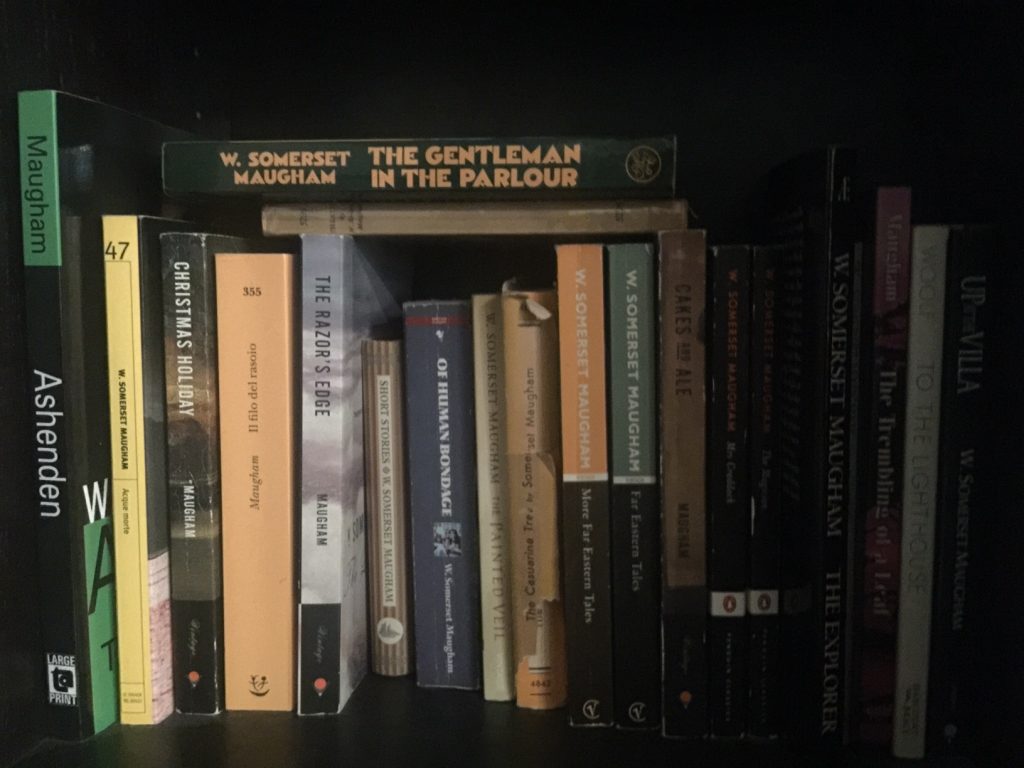by Alessandra Ressa
Reading is my biggest passion. My apartment is literally packed with books from floor to ceiling. Every room has its own big library but there seems to never be enough space, so books lie around in piles on the floor, on chairs and on window sills. I can proudly say I’ve read most of them, with only a few abandoned before completion.
As we chose to give up television a long time ago (13 years and counting), reading has become the evening past time for the whole family. In winters, we light a fire, grab a book and sit comfortably together on our big sofa, fighting over who gets to have a cat on the lap. There are plenty of books here, but not enough cats.

I never read one book at a time but rather five or six at the same time. I get criticized a lot for this, as apparently this is an indication of a voluble soul. To the contrary, I can pick my evening reading according to my mood and energy. A novel will do when I’m particularly tired, military history will give me unusual perseverance, a travel book will take me places.
Among the books I’m reading at the moment, Charles Lever’s That boy of Norcott’s is certainly worth a mention. It is a typically Victorian novel with a half picaresque, half Dickensian dandy hero who travels from Ireland to Trieste to Croatia in his attempt to cope with life’s misfortunes.
Lever lived and worked in Trieste in the mid 1850s (see article) and is buried in St Anna Anglican cemetery, with his wife Kate. Entertaining in its outdated, elegant literary style, this novel, like many others written by this prolific Irish author, appears to have unfairly fallen into oblivion. When I tried to find this particular title, I discovered it had been out of print for decades. I managed to have a copy especially printed for me by Santa Claus at a reasonable price but, to save paper, 400 pages were condensed into 80, and now I need a magnifying glass to read each line. Consequently, it’s taking some time…

A book that really inspired my traveling and introduced me to what became my great passion for Asia is W. Somerset Maugham’s The Gentleman in the Parlour. Beautifully written in the 1920s with that typical descriptive and sensitive style that brought this English writer to be one of the most appreciated worldwide, this isn’t one of his inspired novels but a classic record of a journey from Rangoon to Haiphong during colonial times.
Maugham traveled via canoe and riverboat, rickshaw and even pony from Rangoon to Mandalay (in former British colony Burma until 1948, today Myanmar), and on to Haiphong, in Vietnam, then a French colony. The Gentleman in the Parlourreveals in colorful detail the beautiful Far Eastern countryside and the numerous people Maugham met along the way, from disgruntled Europeans stranded in the East to local inhabitants whose lifestyle had changed little in over a thousand years. Needless to say, when I put it down I packed my backpack and left to Southeast Asia.

Similarly, a book that inspired me into becoming a journalist is again another travel book that has unfortunately been out of print for some time, Knud Holmboe’s Desert Encounter. This is a book of endless wonder and if you are lucky to find a copy you will understand why. Holmboe was a Danish journalist, author and explorer who, after a sojourn in North Africa, converted to Islam in 1929.
Six years later, he published a book based on his adventures on a journey through Libya, that later became famous. The book exposed the maltreatment of the population the author had witnessed on his journey and the atrocities committed by the Italian colonial power. This account is especially valuable for its description of the concentration camps into which Italian colonial powers forced Bedouin Arabs and where “torture, humiliation, and famine” were rife. Holmboe was murdered on the way from Jordan to Saudi Arabia in October 1931. Some suspect that Italian intelligence officials, connected to the fascist regime of Benito Mussolini, conspired in his death.
As my inexplicable interest in military history has always puzzled my parents and intrigued my early pursuers (by age five I played with tin soldiers, watched black and white war movies and to this day my all-favorite board game remains Risk!), I have quite an extensive collection of books I’ve read avidly throughout the years.
My regret is not having lived and fought in a war, survived and written about it. I guess there’s still time…However, if I had to make a war novel mine, it would definitely be The thin red line by James Jones- a rare, powerful, direct and honest account of combat in the Pacific during World War II.

There are very few books I wasn’t able to finish. To me, reading was like running a marathon, no matter how tired I was, how hard it was raining or how scorching the sun was, no matter how long it was going to take me to get there, I had to reach the finish line.
Then I became wiser and learned to say stop. Life is too short, and there are so many great books that I’ll probably never get to read due to lack of time. I think I hit the record low of shutting a book after reading only one page with The Da Vinci Code by Dan Brown. I should have known when my mother recommended it, but I had to see for myself.
A book I often give as a gift, being one of my favorite and excellently translated both into Italian and English is Botchan by Natsume Soseki. Most people are not familiar with Japanese literature (I find people going as far as horrendous Haruki Murakami or Banana Yoshimoto) and I often feel like introducing my friends to the beauty and poetic style of a true Nipponic masterpiece. Botchan is the Japanese equivalent of Catcher in the Rye or Huckleberry Finn. Written in 1906, it is a hilarious tale about a young man’s rebellion against “the system” in a country school.
And lastly, there are just a few reads I go back to from time to time and always find them soothing in their own way. One is definitely The plague (La peste) by French Nobel Prize winner Albert Camus. I have taught myself French in order to read Camus and it was worth the effort. Written in 1947, the visionary novel has never been so current. And every time I read it I find new interpretation keys, whether about the hopeless nature of a human being at times of calamities, or about the ability of a human being to survive.
In my list of comfort reads I also wish to mention a couple of comic books, such as Persepolis by Marjane Satrapi, and The Arab of the Future by Riad Sattouf, where the difficult lives of the authors (respectively in Iran and Syria) are wittingly told through laughs and tears.






























I absolutely loved this article and the accompanying photos of the library (which I suppose is Alessandra’s library?). I am a big bookworm and cannot go to sleep without reading at least few chapters of a book. I have just moved to Trieste and also me and my partner agreed that we won’t have a TV at home, which turned out to be the best decision.
While reading this article I actually thought of starting a little book club where international people could weekly/monthly swap their books? I think it would be particularly interesting as I suppose that we all have many books in different languages.